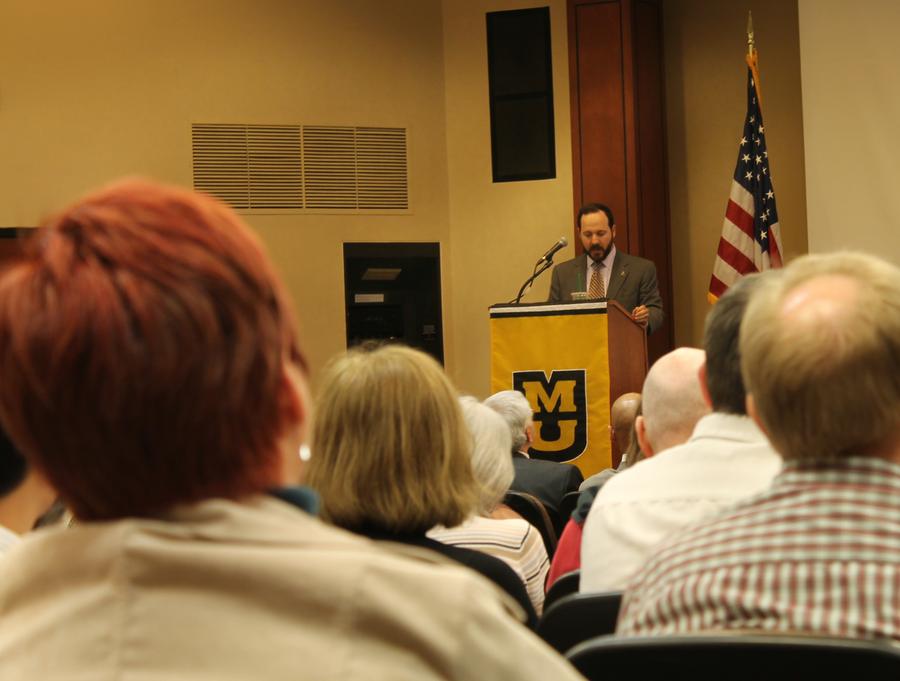
Faculty Council Chairman Ben Trachtenberg wants MU faculty and administrators to have a better relationship with the UM System Board of Curators.
Trachtenberg delivered the opening address at the spring semester general faculty meeting on Wednesday, where other topics of discussion included diversity initiatives, the budget and the decline in enrollment for fall 2016.
Trachtenberg said it was important to have a better relationship with the board. When problems arise, Trachtenberg said mutual trust would result in better communication.
“I’ve heard top administrators say they don’t know curators at all,” Trachtenberg said.
He said he would be willing to meet with the curators as well as legislators and members of the Missouri community to forge a better relationship.
“Perhaps I’m dually optimistic, but I think if we knew each other better, it might be easier to find common ground on the area where common grounds exist,” Trachtenberg said.
Interim Chancellor Hank Foley addressed the projected decline in enrollment for fall 2016. Out of the 1,500-student decrease, 800 was due to a general drop in high school graduates, Foley said. Another 500 of the decline come from Illinois students deciding to go to their state schools because of a “tweaking of Illinois entrance standards.” He said 600 students probably decided to attend elsewhere because of the events of the fall.
“It’s a combination of the media narrative that’s been put out there about us,” Foley said. “It’s a combination of politics of the situation … and so in states around Missouri where we are normally getting students from, they just aren’t coming, and that’s very unfortunate.”
####Diversity Update
Interim Vice Chancellor for Inclusion, Diversity and Equity Chuck Henson updated faculty on new programs and initiatives. He said it was important to engage in conversations about the truth and reflect on the “potential for the future.”
“The truth scares the hell out of us,” Henson said. “The facts scare us, and we have to embrace the facts. We have to embrace the facts of our sharedness and our shared history, which will help us do a lot better with (answering the question of), ‘How do we treat each other?’”
Henson also recognized faculty for their work and said while he receives credit for many of the new programs, none of it would be possible without the faculty who dedicate time to implement the new initiatives.
“It’s not about me,” Henson said. “I appreciate the acknowledgements, but nothing that has been accomplished would have happened if it was just one person. It’s not just one person. There are so many in this room who have answered the call of service … I want to thank you all.”
Henson also discussed the Working Group, a collaborative group between Henson, members of the Division of Inclusion, Diversity and Equity and student leaders.
“Student leaders on campus get a view on the work we’re doing and get an opportunity to comment on it,” Henson said.
One of the new initiatives is a lecture series presented by MU and the State Historical Society of Missouri’s Center for Missouri Studies called the African American Experience in Missouri. Each monthly lecture discusses a different topic in the history of blacks in Missouri.
Additionally, there is the Create a Better Mizzou Project, an extension of the Working Group that is open to the public. Topics range from discussing First Amendment rights to answering questions about the meaning of shared governance.
Additional projects and initiatives are being planned, Henson said, including the possibility of a new race institute, diversity summit and lecture series on Native American history.
####Budget Update
Vice Chancellor for Finance Rhonda Gibler spoke to the faculty in attendance about the university’s budget.
Gibler said budget forums, where faculty will have the opportunity to ask questions about the budget, are being planned within the next few weeks.
MU has had budget issues throughout the 21st century, Gibler said. In the 1980s, funding came in a majority from state appropriations; now, a majority of funds are gained through tuition and fees with relatively little state appropriations.
While Missouri is not the only state that has had a decrease in state funding, placing 44th, it is lower in appropriations per capita than most other states.
“The other thing you take into consideration when you think about how we’re positioned to be competitive in Missouri is that our neighboring states … the states that we might have the greatest ability to recruit other students from, they all are funded at a better per capita level than we are here in Missouri,” Gibler said.
Illinois is sixth, Arkansas is 10th and Tennessee is 30th in the nation for state appropriations per capita.
Since nonresident students pay higher tuition, a decrease in nonresidential students is a costlier loss. Gibler said there is a larger projected decrease in nonresidential students than residential students, resulting in a greater loss than if it was mostly a decline from residential students.
_Edited by Taylor Blatchford | [email protected]_